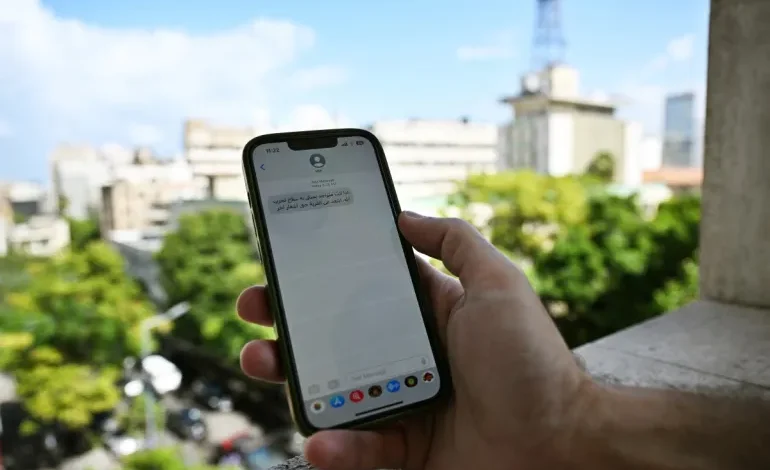‘Get away from Hezbollah’: Has Israel hacked Lebanon’s telecoms networks?

Israeli military officials have warned residents in southern Lebanon and parts of Beirut to evacuate villages and neighbourhoods, sparking worries of a bombing campaign exploding into a full-blown war — and concerns that Israel had hacked into its northern neighbour’s telecommunications networks.
The bombing began within hours of Monday’s warnings, and more than 270 people have been killed in attacks across Lebanon’s south and east.
And later in the evening, Israel announced that it had also bombed parts of Beirut.
As fears of a war escalate, the warnings, experts say, are in themselves also a reminder of Israel’s technological superiority over Lebanon. They also repeat a playbook that Israel has used in Gaza.
Here’s what’s happened, why the warnings are significant and how Israel might have gained access to the private communication details of people across Lebanon.
What’s happened?
Residents of villages in southern Lebanon and in some Beirut neighbourhoods received messages and phone calls from a Lebanese number early on Monday ordering them to move away from Hezbollah strongholds.
Some people received recorded calls to their mobile phones or their landlines while some received text messages, Al Jazeera’s Mazen Ibrahim reported from Beirut. The messages were all the same, he said.
One message seen by Al Jazeera was delivered at about 8:20am [05:30 GMT] and read: “If you are in a building with Hezbollah weapons, stay away from the village until further notice.”
Radio broadcasts were also hacked to deliver the messages, Al Jazeera correspondents reported on Monday.
“We ask residents of Lebanese villages to pay attention to the message and warning published by the [Israeli military] and heed them,” Israeli army spokesman Daniel Hagari said in a video statement posted on the X platform early on Monday.
Ibrahim from Al Jazeera said the areas people were asked to evacuate have already witnessed high levels of displacement since October 8, the day Israel and Lebanon began trading fire.
“These are communities that have seen more than 100,000 people leave in the 11 months of war,” he said. “Only some people remain there — those who have refused to move so far.”
In Beirut, Lebanese Information Minister Ziad Makary was among those who received a recorded phone call, according to the state-run National News Agency.
“What we don’t know is how Israel got these details of people — cellphone numbers, locations. … Is it because of data leaks or because Israel has hacked into Lebanon’s telecoms infrastructure?” Ibrahim said.
Ibrahim from Al Jazeera said the areas people were asked to evacuate have already witnessed high levels of displacement since October 8, the day Israel and Lebanon began trading fire.
“These are communities that have seen more than 100,000 people leave in the 11 months of war,” he said. “Only some people remain there — those who have refused to move so far.”
In Beirut, Lebanese Information Minister Ziad Makary was among those who received a recorded phone call, according to the state-run National News Agency.
“What we don’t know is how Israel got these details of people — cellphone numbers, locations. … Is it because of data leaks or because Israel has hacked into Lebanon’s telecoms infrastructure?” Ibrahim said.
Are these more than warnings?
Israel says its army sends warnings before bombings to minimise civilian casualties. That has been the country’s argument in Gaza during the ongoing war there, too.
But the facts on the ground don’t back that up. In many cases, Israel’s bombs have landed on buildings whose residents received no warnings. In other cases in Gaza, fleeing civilians have been attacked by Israeli forces.
The warnings can come in the form of text messages, phone calls or dropped leaflets. But the phone-delivered warnings in Gaza, experts have said over the years, are also an example of psychological warfare — a reminder to Palestinians that Israel’s security apparatus knows exactly where they are at any point in time.
The same tools used for precise warnings are also what has helped Israel to target its missiles.
On Monday, that pattern, which Gaza is familiar with, appeared to have extended into Lebanon.
How did Israel infiltrate Lebanese telecoms networks?
Last week, at least 37 people died after thousands of low-tech pagers and walkie-talkies presumed to belong to members of the Lebanese armed group Hezbollah exploded. Nearly 3,000 people were injured. Lebanon, Hezbollah and the group’s allies such as Iran blamed Israel. While Israel didn’t claim responsibility, most experts concluded it was behind those explosions.
While experts believe Israel planted explosives in those devices months before they were detonated, the ability to send targeted warnings to individuals in specific parts of Lebanon suggests that Israel has access to real-time information about Lebanese civilians — not just its supposed enemies in Hezbollah.
That’s not surprising, said Elijah Magnier, a risk and conflict analyst.
Magnier, who closely watches Israel’s conflicts in the Middle East, told Al Jazeera that Israel had hacked Lebanese networks way before October 8.
“They have access to landlines, car plate numbers, mobile phones — to the point that they are able to communicate to anyone in the south of Lebanon exactly as they are able to do in the West Bank or Gaza,” he said.
Sophisticated spyware technology and equipment means that Israel’s Mossad intelligence agency can map exactly who lives where, what phone numbers they have and who frequents their homes, Magnier said.
Spies, he added, can collect thousands of IP addresses in towns and cities just by driving on the streets with their equipment. When Israel’s intelligence detects a larger collection of phones than usual in a particular area, it can conclude that there’s an unusual event — like a Hezbollah meeting, for example — and deploy missiles, he added.
Has Israel issued such warnings before?
During the current war, Israel has so far dropped pamphlets to alert Lebanese border communities of an impending bombing campaign.
But it has in the past also been accused of hacking Lebanese telecommunications networks.
In 2018, Amal Mudallali, Lebanon’s permanent representative to the United Nations, accused Israel of hacking mobile lines and sending recorded messages to civilians in Kafr Kila village, warning them of imminent explosions amid tensions between Hezbollah and Israel that year.
“This constitutes a new and extremely serious attack on the security and safety of the citizens of Lebanon, whereby Israel is violating the dignity and privacy of individuals and making a direct threat against their lives,” Mudallali wrote in a letter to the UN Security Council, asking for condemnation of Israel’s “hostile” behaviour.
Israel is also known for its strong capabilities in breaking into electronic devices using malware.









